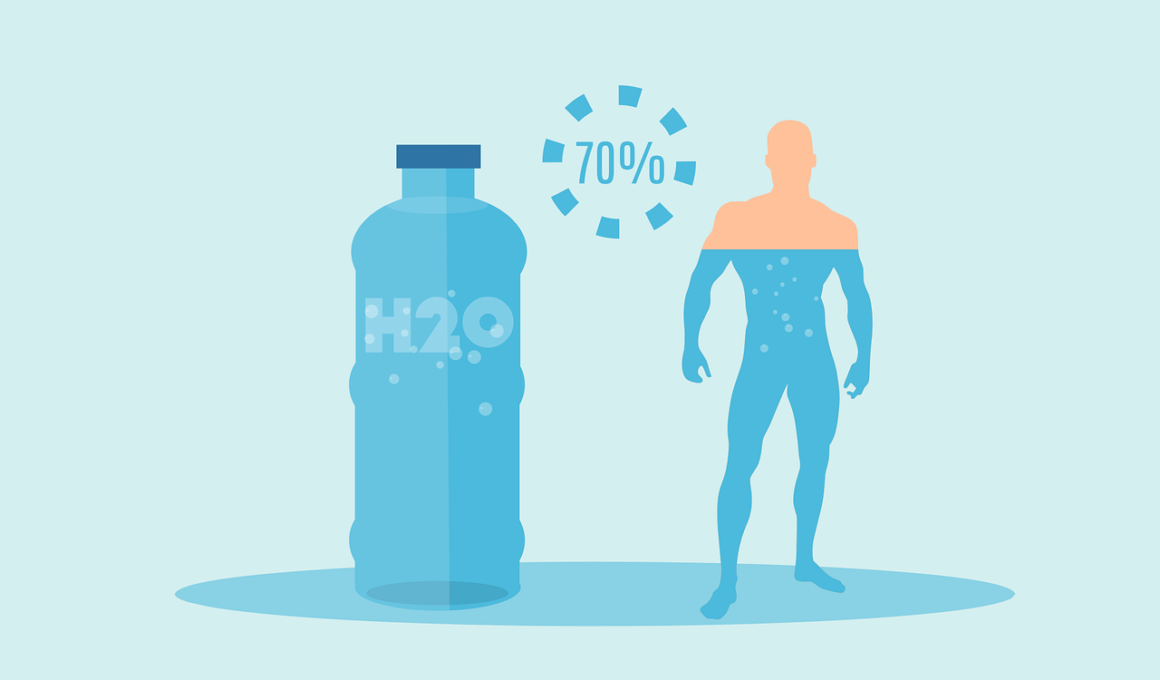Hydration Strategies for Endurance Athletes
Hydration is crucial for all athletes, particularly endurance athletes engaged in prolonged events, such as marathons or triathlons. Proper hydration strategies can significantly enhance performance and prevent the risk of dehydration. During intense exercise, the body loses fluids through sweat, which can lead to decreased endurance, increased heart rate, and impaired performance. Athletes should aim to consume fluids before, during, and after their workouts. This can include water, electrolyte drinks, or specialized hydration solutions. It’s pivotal to understand individual hydration needs, which can vary based on sweat rates and environmental conditions. Using the guidance of sports nutritionists can be beneficial in establishing a tailored hydration plan. Additionally, monitoring urine color can help athletes assess their hydration status. Pale yellow indicates adequate hydration, while darker shades suggest the need for more fluids. Endurance athletes must prioritize hydration, especially when training in hot or humid conditions, as these environments can exacerbate fluid losses. By adopting effective hydration strategies, athletes can maintain optimal performance throughout their training and competitions.
The Importance of Electrolytes
Electrolytes play a vital role in maintaining fluid balance and ensuring proper muscle function during endurance activities. These essential minerals, which include sodium, potassium, calcium, and magnesium, are lost through sweat and can affect performance if levels drop too low. An imbalance in electrolytes can lead to muscle cramps, fatigue, and heat-related illnesses. Endurance athletes should not only drink water but also consume electrolyte-rich fluids or supplements to replenish these vital nutrients lost during exercise. Sports drinks are a popular choice, as they provide both fluids and electrolytes, maintaining optimal hydration status. Additionally, whole foods like bananas, oranges, and salty snacks can help restore electrolyte levels pre- and post-exercise. It’s essential for athletes to remember that hydration is not solely about water intake; incorporating electrolyte sources into their regimen is equally critical for sustaining energy and performance levels. Some athletes may prefer to use electrolyte tablets or powders, allowing for personalized supplementation levels. In summary, effectively managing electrolyte intake is a key component of a successful hydration strategy for endurance athletes.
Pre-exercise hydration is a vital step that should not be overlooked by endurance athletes. Proper hydration before a training session or race can substantially influence overall performance. It is recommended that athletes drink fluids at least two to three hours prior to physical activity, ensuring their bodies are adequately hydrated. The amount of fluid to consume varies among individuals, but a guideline is to drink approximately 16 to 20 ounces of fluid in the hours leading up to exercise. Athletes should adapt their pre-hydration plans depending on physical conditions and individual sweat rates. Furthermore, including small amounts of carbohydrates or electrolytes in pre-exercise drinks can enhance hydration effectiveness and energy availability. Monitoring hydration status before training can be beneficial, as athletes can check their weight and urine color for cues on their hydration levels. Strategies like setting hydration reminders or integrating fluid intake into their warm-up routines can also contribute to better hydration practices. Preparation plays a key role in ensuring athletes start their endurance events well-hydrated, setting the stage for optimal performance.
During endurance events, maintaining hydration becomes a critical focus, as athletes have to balance fluid intake with performance variables. The athlete’s hydration strategy during exercise should account for the duration and intensity of the event. Consuming 7 to 10 ounces of fluid every 10 to 20 minutes is typically recommended for optimal performance. Sports drinks containing carbohydrates and electrolytes can further aid in energy levels and hydration. However, athletes need to experiment with various drink flavors and compositions during training, as preferences may differ from one individual to another. Ensuring that hydration practices are practical and efficient during races can make a significant difference in performance outcomes. Carrying personal hydration systems, such as belts or bottles, allows athletes to sip fluid at intervals, rather than overloading at once. Additionally, many events provide hydration stations enabling racers to hydrate more easily. Nevertheless, adjusting fluid intake based on environmental conditions—such as heat, humidity, and altitude—is essential to preventing under or overhydration. Continuous monitoring and adjusting hydration strategies during exercise will help athletes maintain an optimized performance level.
Post-exercise Recovery Hydration
Post-exercise hydration is an essential aspect of the recovery process for endurance athletes. After a prolonged event, fluid loss needs to be accounted for to ensure proper recovery. Athletes should aim to replace fluids lost during exercise by consuming about 16-24 ounces of fluids for every pound lost. Rehydration should commence as soon as possible after an event, preferably within 30 minutes. This can include a combination of water and electrolyte drinks for replacing lost minerals and restoring balance. Additionally, many athletes find that consuming a snack or meal that incorporates both proteins and carbohydrates alongside fluids can be more effective for rehydration and muscle recovery. Foods like recovery smoothies, yogurt with fruit, or snacks that contain sodium and potassium can enhance replenishment. Employing a structured recovery plan that includes adequate hydration is critical for athletes to feel refreshed and ready for future training or events. Continuous fluid intake can also minimize delayed onset muscle soreness, boosting overall recovery. In summary, a well-structured post-exercise hydration strategy supports optimal recovery and future performance.
Hydration needs can vary significantly between athletes due to numerous factors such as size, gender, activity level, and the environment. This variability necessitates a personalized approach to hydration tailored to individual requirements and preferences. Conducting hydration tests during training can provide valuable insight into specific fluid needs for each athlete. Monitoring body weight before and after workouts can inform athletes about fluid losses and inform strategies to address their unique requirements. In addition to beverage options, incorporating water-rich foods, such as cucumbers, oranges, and watermelon, can also contribute to hydration efforts, especially when training intensity increases. Educating athletes on the signs of dehydration—such as fatigue, dizziness, or dark urine—is essential for timely intervention and rehydration. Setting individual hydration goals can motivate athletes to keep track of their intake throughout their training regimen. Understanding personal hydration needs and adjusting fluid intake to align with these factors can significantly enhance performance. Overall, a well-thought-out hydration plan tailored to individual circumstances is essential for successful endurance performance.
Conclusion: Hydration and Endurance
In conclusion, hydration is a critical aspect of endurance training and performance that should be prioritized. Athletes must develop comprehensive hydration strategies tailored to their individual needs, including pre, during, and post-exercise hydration. By understanding the role of fluids and electrolytes, athletes can prevent dehydration, maximize performance, and ensure optimal recovery after intense activities. The emphasis should be placed on creating a structured hydration plan through trials in training sessions, recognizing signs of dehydration, and monitoring fluid intake closely. Furthermore, education on hydration practices and the consequences of improper hydration can enhance performance readiness and athletic safety. Embracing a proactive approach toward hydration allows athletes to focus on their training and competition without the distraction of hydration-related issues. Hydration practices are not a one-size-fits-all; they must cater to differing abilities, preferences, and environmental conditions. By incorporating these hydration strategies, endurance athletes will be prepared to perform at their best and fully embrace the rigors of their training and competition. Adopting solid hydration practices ultimately can contribute to achieving athletic goals, enhancing health and well-being.


